
 |
|
|
|
#1
|
||||
|
||||
|
The soundpost inlay patch is shaping up well. I'll finish it off and glue it in tonight after the gig.
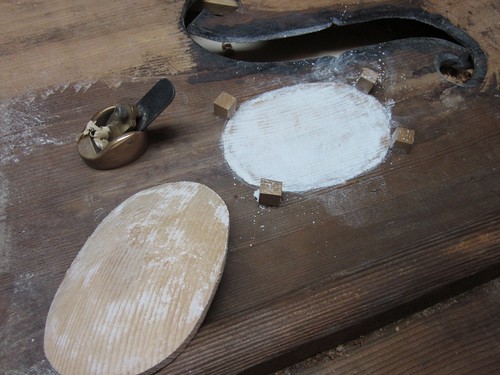 |
|
#2
|
||||
|
||||
|
This is a great thread; I'm following along like a soap opera. Sorry, daytime drama.
 Thanks for posting; the photos are great - I wish I had the patience to stop in the middle of doing anything and taking so many photos! |
|
#3
|
||||
|
||||
|
Thanks for all the bass love guys. Unfortunately for me I'll have to give the bass back to the client when it's complete! But fortunately for me, I have a french lodger for the next year or so.
|
|
#4
|
||||
|
||||
|
Here's the patch just before gluing in:
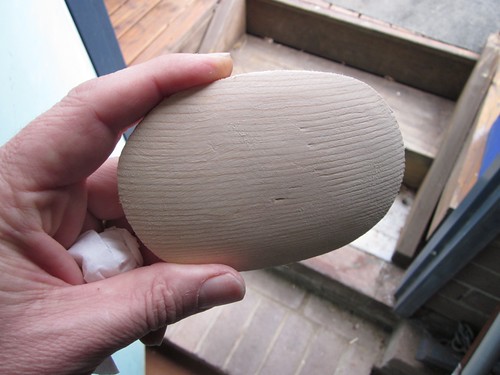 And here's the patch glued in and trimmed: 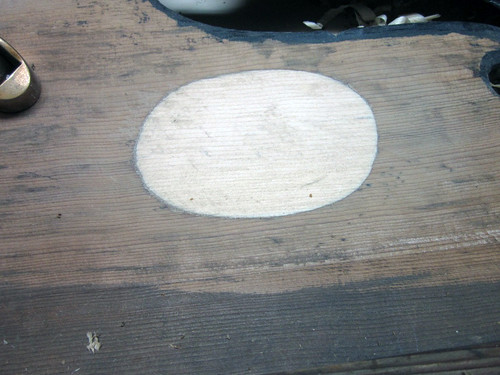 You can see how nicely it fits at the edges. I'm pretty happy how it turned out :-) 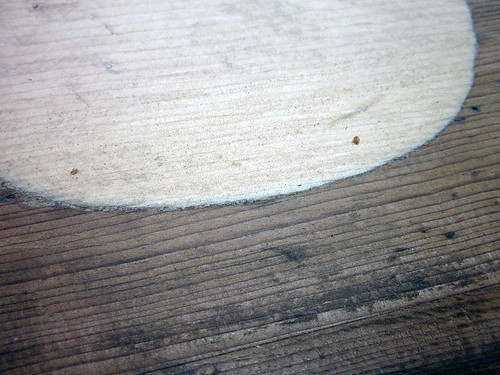 I decided that I *would* shave the thin dark layer off the surface of the wood, at least as far as the bass bar, and I'm glad that i did. These patches look as if they are reinforcing the main centre glue line. 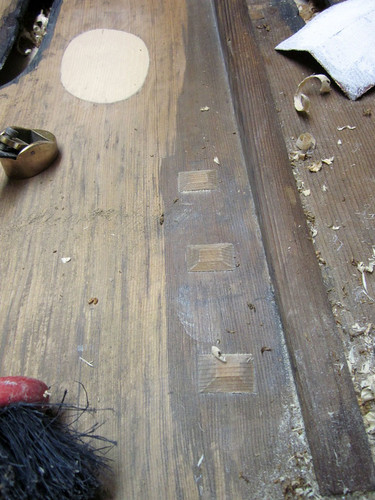 But when the dark layer is removed, it's very clear that there's another previous crack there that I couldn't see before (see next pic). It's a bit of a pity to remove the dirt/patina, but going back to clean wood is going to allow me to make better repairs, and as the purpose is to result in a functional bass, I think the decision is sensible. 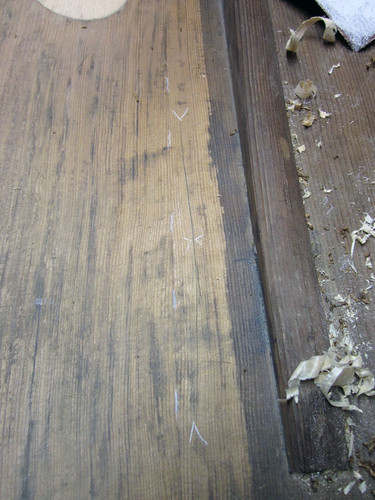 This is a nice view of repaired top to date. 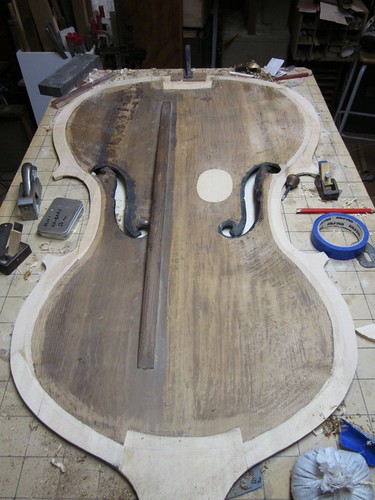 We've made it from here: 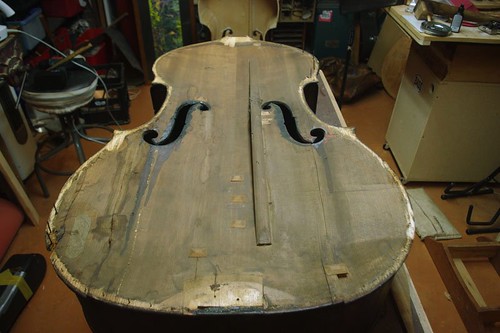 to here: 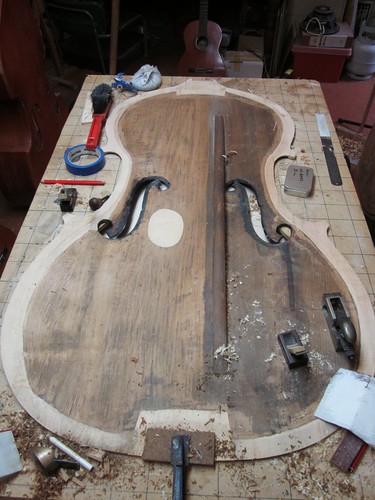 And I really MUST do something about getting a consistent colour-balance in my photos! Last edited by Matthew Tucker; 09-09-2010 at 11:59 PM. |
|
#5
|
||||
|
||||
|
Here you can clearly see what I'm doing.
On the left hand side is the colour of the wood as the bass came to me. Yes it is oxidised but also has traces of old glue and no doubt tobacco smoke and other muck. You can clearly see the white new wood i have added, and then the areas I have scraped back to clean old wood in the foreground. I've left, for the moment, a strip alongside the bass bar. If I decide to leave the bar, I'll leave the dark strip as well. If I decide to replace the bar, I'll probably scrape it back too. 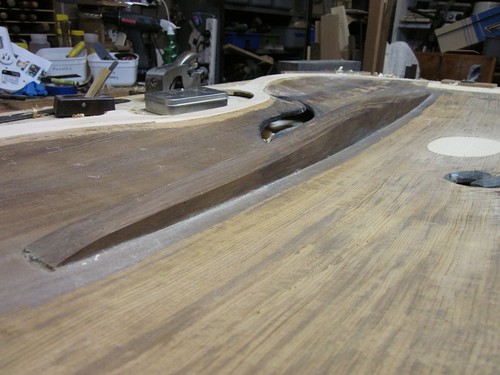 The bar looks original, is fairly hefty, and is well-attached. It is however glued exactly parallel with the centre joint, which is not modern practice. At the moment I'm inclined to leave it in place, perhaps reshape it a little, but I'll reserve my decision after the top is fully together and I've had a chat with the client. Bassbar opinions anyone? |
|
#6
|
||||
|
||||
|
If the bassbar seems reasonable in size and shape, and has kept the top in shape - why do anything to it just because it isn't how we might make it today?
|
|
#7
|
||||
|
||||
|
Quote:
Either way, it is not how we put bars in today as you've said. Actually, I did do one Bar myself back in the mis '70s when I was fixing up basses for re-sale and that bass was integral as well. It took me a full 8 hour day to plane out the old bar and chalk fit in a new one and shape it. I even put some linen pockets at the ends and an 'L' shaped linen patch touching the side of the bar and top near a small crack. It came out great. Take the bar out and put a new one in that fits this bass, size and width that you can be happy with tonally as well. many many of these French basses were made in factories as well. That is why so many of them look alike rather than from a particular maker. I guess no one alive can tell you how this bass sounds as it was obvious un-played and neglected for a lifetime. These French Vuillaume style Tops are slightly long and wide, especially in the upper bout area where it's shaped like a cello. I am sure you can make and place a better bar in this bass than was done new. Fit it well like you have done with the other work and do it without any spring in the bar as well. Then you will know what's in the bass rather than do it later. Once the top is off, replacing the bar is a lot less work. My Prescott was a bass with a perfectly arched and well graduated top. The bar was as old as it was a 4-string bass. It was left in but re-shaped. The old straight set bar shadow was still visible. Also, on my old 4/4 Gamba bass it had a secondary bar as well but was short, narrow and shallow. It looked like a Gut string bar possibly for 3-strings, maybe 4 but was for Gut. The Top shaping/arch was again perfect like with the Prescott bass. Both basses sounded fantastic and looked healthy after the restoration and strung with steel strings and C extension. A healthy top also helps. Replace the bar with one you feel certain about. |
|
#8
|
||||
|
||||
|
Ken -
So you assume that if the bar is left as-is, the top will sink under the tension of modern strings? And that ultimately it is better to go ahead and fit a new, stronger bar? |
 |
| Currently Active Users Viewing This Thread: 5 (0 members and 5 guests) | |
| Thread Tools | |
| Display Modes | |
|
|